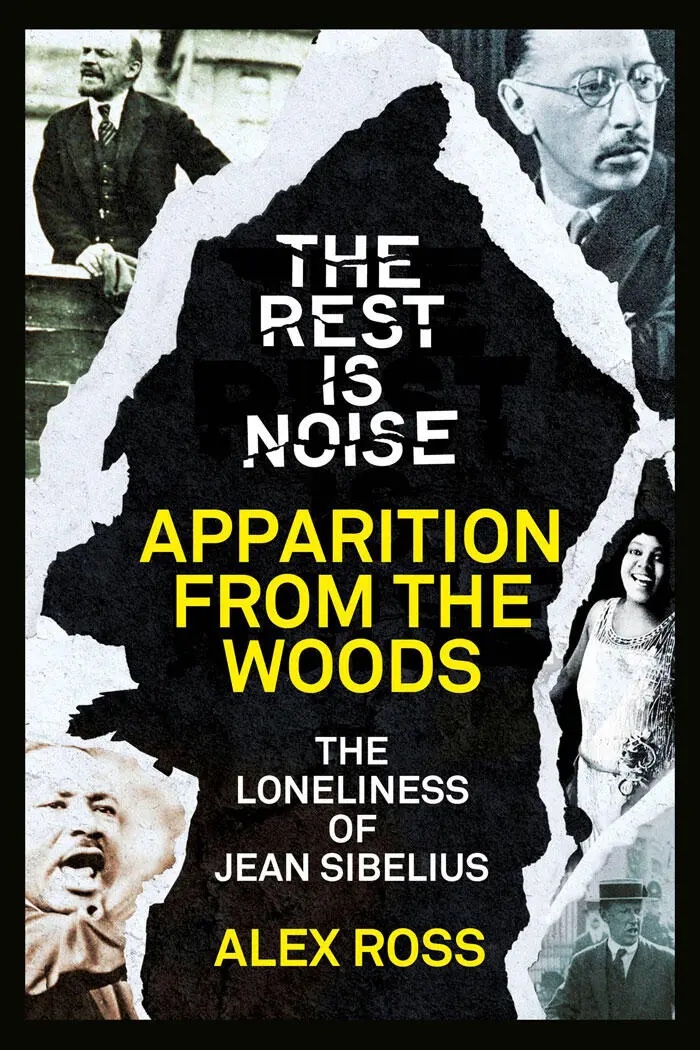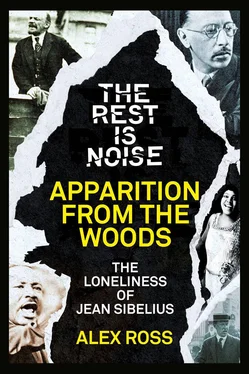
This is a chapter from Alex Ross's groundbreaking history of 20th century classical music, The Rest is Noise .
It is released as a special stand-alone ebook to celebrate a year-long festival at the Southbank Centre, inspired by the book. The festival consists of a series of themed concerts. Read this chapter if you're attending concerts in the episode The rise of nationalism: rediscovering roots and folk culture.
Alex Ross, music critic for the New Yorker , is the recipient of numerous awards for his work, including an Arts and Letters Award from the American Academy of Arts and Letters, the Belmont Prize in Germany and a MacArthur Fellowship. The Rest is Noise was his first book and garnered huge critical acclaim and a number of awards, including the Guardian First Book Award and the National Book Critics Circle Award. He is also the author of Listen to This.
APPARITION FROM THE WOODS
The Loneliness of Jean Sibelius
From The Rest Is Noise by Alex Ross
Contents
Apparition from the Woods
Notes
Suggested Listening and Reading
Copyright
About the Publisher
5 APPARITION FROM THE WOODS
The Loneliness of Jean Sibelius
Composing is a difficult business. “Desperately difficult,” says the devil in Doctor Faustus. It is a laborious traversal of an imaginary landscape. What emerges is an artwork in code, which other musicians must be persuaded to unravel. Unlike a novel or a painting, a score gives up its full meaning only when it is performed in front of an audience; it is a child of loneliness that lives off crowds. Nameless terrors creep into the limbo between composition and performance, during which the score sits mutely on the desk. Hans Pfitzner dramatized that moment of panic and doubt in Palestrina, his “musical legend” about the life of the Italian Renaissance composer. The character of Palestrina speaks for colleagues across the centuries when he stops his work to cry, “What is the point of all this? Ach, what is it for? What for?”
Jean Sibelius may have asked that question once too often. The crisis point of his career arrived in the late 1920s and the early ’30s, when he was being lionized as a new Beethoven in England and America and dismissed as a kitsch composer in the taste-making Austro-German music centers. The contrasts in the reception of his music matched the manic-depressive extremes of his personality—an alcoholic oscillation between grandiosity and self-loathing. Sometimes he believed that he was in direct communication with the Almighty—“For an instant God opens his door,” he wrote in a letter, “and His orchestra plays the Fifth Symphony”—and sometimes he felt worthless. In 1927, when he was sixty-one years old, he wrote in his diary, “Isolation and loneliness are driving me to despair ... In order to survive, I have to have alcohol ... Am abused, alone, and all my real friends are dead. My prestige here at present is rock-bottom. Impossible to work. If only there were a way out.”
Sibelius spent the last part of his life at Ainola, a rustic house outside Helsinki, Finland. On his desk for many years lay the Eighth Symphony, which promised to be his summary masterpiece. He had been working on it since 1924, and had indicated several times that it was almost ready for performance. A copyist transcribed twenty-three pages of the score, and at a later date Sibelius’s publisher may have bound the manuscript in a set of seven volumes. There were reportedly parts for chorus, as in Beethoven’s Ninth. But the Eighth never saw the light of day. The composer finally gave in to the seduction of despair. “I suppose one henceforth takes me as—yes!—a ‘fait accompli,’ ” he wrote in 1943. “Life is soon over. Others will come and surpass me in the eyes of the world. We are fated to die forgotten. I must start economizing. It can’t go on like this.”
Aino Sibelius, the composer’s wife, for whom the house was named, recalled what happened next: “In the 1940s there was a great auto da fé at Ainola. My husband collected a number of manuscripts in a laundry basket and burned them on the open fire in the dining room. Parts of the Karelia Suite were destroyed—I later saw remains of the pages which had been torn out—and many other things. I did not have the strength to be present and left the room. I therefore do not know what he threw on to the fire. But after this my husband became calmer and gradually lighter in mood.”
Ainola stands much as Sibelius left it. The atmosphere of the house is heavy and musty, as if the composer’s spirit were still pent up inside. But you get a different feeling when you walk into the forest that stretches out on one side of the house. The treetops meet in an endless curving canopy, tendrils of sunlight dangling down. The ground is uncluttered: many paths fork among the trunks. Venturing a little farther into the wood, you lose sight of all human habitation. A profound stillness descends. The light begins to fail, the mists roll in. After a while, you may begin to wonder if you will ever find your way back. Many times in Sibelius’s music the exaltation of natural sublimity gives way to inchoate fear, which has less to do with the outer landscape than with the inner one, the forest of the mind.
In his 1993 essay collection Testaments Betrayed, Milan Kundera anatomizes the more peripheral of the European cultures, taking his native Czechoslovakia as a specimen. “The small nations form ‘another Europe,’ ” the novelist writes. “An observer can be fascinated by the often astonishing intensity of their cultural life. This is the advantage of smallness: the wealth in cultural events is on a ‘human scale’; everyone can encompass that wealth.” Kundera warns, however, that the familial feeling can turn tense and constricting at a moment’s notice. “Within that warm intimacy,” he says, “each envies each, everyone watches everyone.” If an artist ignores the rules, the rejection can be cruel, the loneliness crushing. Even those who rise to fame may experience isolation at the summit—the burden of being a national hero.
Each of the “small nations”—a category into which Western European music experts have tended to dispose not only Nordic and Eastern European countries but also Great Britain, formerly known to Germans as the “land without music”—had its retinue of locally famous composers. A few of them broke out to wider renown, becoming standard-bearers of patriotic feeling. Edvard Grieg, in the late nineteenth century, wrote the “song of Norway.” Karol Szymanowski established a Polish modernist tendency. Edward Elgar, Gustav Holst, Ralph Vaughan Williams, Arnold Bax, and William Walton built up a modern British repertory just as the glory of empire was fading. And Carl Nielsen, in Denmark, wrested music of brilliance and violence from rough-hewn folk melodies. Sibelius, the great composer of the small nation of Finland, set the pace for many others, not only because he forged a vital relationship with his native land but because he succeeded in stamping his own voice on seemingly worn-out, antiquated symphonic forms. Both Bax and Vaughan Williams revered the Finnish master and dedicated works to him; Walton opened his First Symphony with a nod to Sibelius’s Fifth.
As the twentieth century rumbled on, composers with strong national ties were haunted by feelings of obsolescence. Many twentieth-century symphonies, concertos, oratorios, and chamber works of the so-called conservative type were rich in lamentations for a lost world, elegies for the golden age, forebodings of disaster. Some found it difficult to keep writing: Elgar, who died in 1934, failed to finish another large-scale piece after his supremely elegiac Cello Concerto of 1918–19, and Rachmaninov, whom Tchaikovsky had anointed his heir apparent, produced only five major works from 1917 until his death in 1943.
Читать дальше













